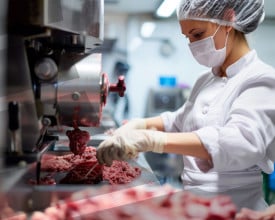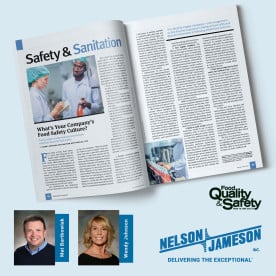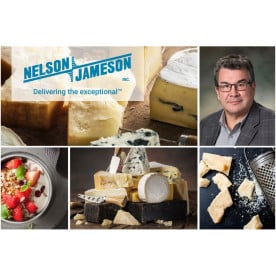Monthly Archives: September 2023
- September 22, 2023
by Steve Funk | Senior Cheese Technologist at Nelson-Jameson
Cultures and enzymes are biological catalysts for dairy product production, but they’re also catalysts for the dairy industry as a whole. These hard-working elements work quietly behind the scenes to strengthen the industry’s brand reputation, increase dairy product market share, and delight consumers.
As the industry continues to adapt to changes and face new and long-standing challenges, cultures and enzymes help dairy advocates respond with answers. The trend toward plant-based alternatives is answered with vegetarian enzymes. Interest in health and wellness is answered with cultures that stimulate the probiotic benefits of yogurts, kefirs, and other cultured dairy. Here are five ways that cultures and enzymes are helping dairy processors.
Consumer Trends: Year after year, dairy processors aim to strike a balance between tradition and innovation. Consumers
- September 20, 2023
Top dairy distributor honored for its safe trucking operations
Marshfield, WI - September, 21 2023 | Nelson-Jameson, a leading distributor in the food and dairy industries with high standards in safety and compliance, has won a Fleet Safety Award from the Wisconsin Motor Carrier Association (WMCA) for the second consecutive year. The award honors the safest truckload fleets in Wisconsin.
Nelson-Jameson qualified for a Fleet Safety Award for Division 1 with a total of 486,256 accident-free miles in Wisconsin. The company maintains extensive safety training, job shadowing, and regular safety check-ins with employees to stress the importance of safety in the workplace.
"Nelson-Jameson places a high emphasis on safety through efficient systems and expert logistics to get our customers what they need when they need it,” said Mike Rindy, Nelson-Jameson president. “We are extremely proud to receive this safety award, which acknowledges
- September 19, 2023
Food Logistics and Supply & Demand Chain Executive honor Dakonya Freis and Devon Vogel
MARSHFIELD, WI – Sept 19, 2023 | Nelson-Jameson, a leading distributor in the food processing industry, announced that two of its female executives - Dakonya Freis, Vice President of Commercial Development, and Devon Vogel, Vice President of Customer Solutions – were honored with Women in Supply Chain Awards. Food Logistics, the only publication exclusively dedicated to covering the movement of product through the global cold food supply chain, and Supply & Demand Chain Executive, the only publication covering the entire global supply chain, named both Freis and Vogel as winners of its annual award. The honor pays tribute to female supply chain leaders and executives whose accomplishments, mentorship and examples set a foundation for women in all levels of a company’s supply chain network.
- September 14, 2023
The food processing industry distributor shares EcoVadis sustainability assessment results
MARSHFIELD, WI – Sept 14, 2023 | Nelson-Jameson, a leading distributor in the food processing industry, announces additional investment
- September 13, 2023
Inspired by nature's influential leadership and nurturing, The Wildwood Park Zoological Society is dedicated to responsible wildlife management and conservation. Formed in 1972, The Wildwood Zoological Society holds sincere appreciation for the animal kingdom and promotes educational programs and activities at the zoo.
Support from donation gifts assist with day-to-day operation expenses, animal care, and enhancing habitat preservation. Funds also help to move forward with bringing new animals to the zoo and developing visionary projects such as the sensory gardens.
Learn - September 12, 2023
Charity Watch
With beliefs and ethics at heart, we consider all potential organizations, whether large or small, for providing financial contributions. We resonate with organizations that set charitable goals that are meaningful to our mission and values.
American Institute of Philanthropy is an independent, assertive organization that seeks to provide reliable information for the contributing donor. Providing in-depth analysis and reporting, donors are informed about how to effectively maximize their contributions to specific causes and organizations that are important to them. Their efficient work allows fund contributions to go completely to the programs that donors selected to support and funds are used for their intended purposes.
- September 12, 2023
Through the expression of art and theater, we are able to see the world through someone else's eyes. With deep ties to the creative arts, Nelson-Jameson generously supports the American Players Theater —allowing local artists to shine in their true passions.
Located just outside Spring Green, Wisconsin, American Players Theater (APT) resides on 110 acres of rolling woods and meadows where timeless classics are performed. Two theatres are located on the grounds—an indoor theater that accommodates 201 seats and an outdoor amphitheater that features 1,075 seats (making it the country's second largest outdoor theater devoted to arts).
APT is dedicated to other areas of the arts—through tours, discussions, workshops, and training programs—offering experiences to enrich your overall well-being.
- September 12, 2023
For more than 100 years, the mission of Big Brothers Big Sisters has been to improve the lives of children, providing them with mentorship, guidance, and positive interaction.
In 1902, a court clerk named Ernest Coulter had noticed more and more boys coming through the court system. Concerned about their well-being and safety, Ernest set out to find volunteers to help keep them out of trouble. Ladies of Charity, later known as Catholic Big Sister of New York, befriended young girls for the same purposes. Both organizations merged in 1977 to become Big Brothers Big Sisters of America—with the mission of creating and supporting one-to-one mentoring relationships that ignite the power and promise of youth.
Financial contributions help fund the careful one-to-one matching as well as the ongoing professional mentoring support the organization is built upon.





